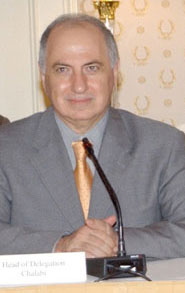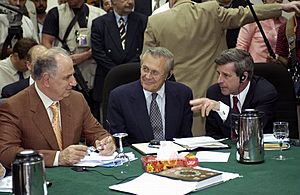Ahmed Chalabi facts for kids
Quick facts for kids
Ahmed Chalabi
أحمد الجلبي |
|
|---|---|

Chalabi in 2003
|
|
| Deputy Prime Minister of Iraq | |
| In office 1 May 2005 – 20 May 2006 |
|
| Prime Minister | Ibrahim al-Jaafari |
| Preceded by | Rowsch Shaways |
| Succeeded by | Barham Salih |
| Minister of Oil | |
| In office 16 April 2005 – 1 January 2006 |
|
| Prime Minister | Ibrahim al-Jaafari |
| Preceded by | Bahr al-Ulloum |
| Succeeded by | Hussain al-Shahristani |
| President of the Governing Council of Iraq | |
| In office 1 September 2003 – 30 September 2003 |
|
| Leader | Paul Bremer |
| Preceded by | Ibrahim al-Jaafari (as prime minister) |
| Succeeded by | Ayad Allawi |
| Personal details | |
| Born |
Ahmed Abdel Hadi Chalabi
30 October 1945 Kadhimiya, Iraq |
| Died | 3 November 2015 (aged 70) Kadhimiya, Iraq |
| Political party | Iraqi National Congress |
| Spouse | Leila Osseiran |
| Alma mater | Massachusetts Institute of Technology University of Chicago |
Ahmed Chalabi was an important Iraqi politician. He helped create the Iraqi National Congress (INC). He served as the President of the Iraqi Governing Council and later as a Deputy Prime Minister of Iraq. He also held the role of interim Minister of Oil.
Before the 2003 invasion of Iraq, Chalabi and the INC provided information to the U.S. government. This information included claims about weapons of mass destruction in Iraq. Much of this information was later found to be incorrect. This led to a change in his relationship with the U.S. government. Chalabi also faced legal issues in Jordan related to a bank he founded. Later, some officials believed he was working on behalf of Iran.
Contents
Early Life and Education
Ahmed Chalabi was born in Kadhimiya, Iraq, in 1945. His family was a well-known and wealthy Shia family in Baghdad. They had a long history in Iraq and ran the country's oldest commercial bank. His father was a successful grain merchant and a member of the Iraqi parliament.
Chalabi left Iraq with his family in 1958 after a military takeover. He spent most of his life living in the United States and the United Kingdom. He attended Baghdad College and Seaford College in England.
Studying in the West
While living outside Iraq, Chalabi continued his education. In the mid-1960s, he studied mathematics at the Massachusetts Institute of Technology. He earned a Bachelor of Science degree there. In 1969, he received his PhD in mathematics from the University of Chicago. After that, he worked in the mathematics department at the American University of Beirut.
In 1971, Chalabi married Leila Osseiran. She was the daughter of a Lebanese politician. They had four children together. When the civil war started in Beirut in 1975, he moved to Jordan.
Business and Political Beginnings
Chalabi was a smart investor and built a large fortune. He faced accusations of financial wrongdoing several times during his life. In 1977, he started the Petra Bank in Jordan.
In 1989, the bank faced problems and could not meet financial requirements. An investigation began, leading to accusations of financial misconduct. Chalabi left Jordan before authorities could act. He was later found guilty of financial wrongdoing in Jordan while he was not there. Chalabi always said that these charges were politically motivated.
Life in Exile
By 1992, Chalabi was living in London. He could not return to Iraq because it was not safe for him. He then founded the Iraqi National Congress (INC). This group aimed to change the government in Iraq. The INC welcomed all groups in Iraq, including Arabs, Kurds, Sunni, and Shia Muslims.
Chalabi worked hard to gain support in Washington D.C. In 1995, he convinced President Bill Clinton to support a plan to start an uprising in northern Iraq. Chalabi believed the Iraqi military would help overthrow the leader, Saddam Hussein. However, this effort failed, and many people were killed. After this, Chalabi's visits to CIA headquarters were restricted.
Despite this setback, Chalabi kept working. In 1998, the U.S. Congress passed the Iraq Liberation Act. This law made "regime change" in Iraq an official goal of the U.S. government. The INC received significant funding from the United States.
Role in the Iraq War
Before the Iraq War in 2003, Chalabi had strong connections with some U.S. government officials. He was seen as a supporter of democracy in Iraq by many. He was even a special guest of First Lady Laura Bush at the 2004 State of the Union Address. After the invasion, Chalabi returned to Iraq with U.S. support. He was given a position on the Iraq interim governing council. In September 2003, he served as the council's president.
The CIA was often doubtful about Chalabi and the INC. However, information linked to his group was used by President George W. Bush and British Prime Minister Tony Blair. This information helped justify the invasion of Iraq. One key source, known as "Curveball," provided false claims about mobile biological weapons factories. This information was later found to be untrue.
The INC also worked with the media. They provided information for stories about WMDs. After the war, no WMDs were found. This showed that many of the INC's claims were misleading or made up.
Changing Relationships
As Chalabi's relationship with the U.S. government changed, he became a strong voice for Iraq's Shia population. In 2004, he claimed that leaders around the world were illegally profiting from the Oil for Food program. However, he did not provide evidence for these claims.
Around this time, the U.S. government stopped its regular payments to Chalabi. Iraqi police, with U.S. soldiers, searched his offices and home. They took documents and computers. The U.S. announced they had stopped funding the INC.
In June 2004, there were reports that Chalabi shared U.S. secrets with Iran. Chalabi denied all these charges. An arrest warrant was issued for Chalabi in August 2004 for alleged counterfeiting. He returned to Iraq but was never arrested. The charges were later dropped due to a lack of evidence.
Despite these challenges, Chalabi regained political standing. He was made Deputy Prime Minister on April 28, 2005. He also served as acting oil minister for a time. In November 2005, Chalabi visited the U.S. and met with top officials. He also traveled to Iran to meet with Iranian president Mahmoud Ahmadinejad.
Later Political Activities
The Iraqi National Congress, led by Chalabi, was part of a larger group in the 2005 election. Chalabi hoped to become the Prime Minister of Iraq. However, Ibrahim al-Jaafari was chosen instead.
Before the December 2005 elections, the INC formed its own group. They ran in the elections but did not win any seats in Parliament. Chalabi was not given a position in the new government. He continued to face accusations of corruption, which he denied.
In October 2007, Prime Minister Nouri al Maliki appointed Chalabi to lead a committee. This committee was in charge of improving services in Baghdad. These services included electricity, health, education, and local security.
After the invasion, Chalabi was put in charge of "de-Ba'athification." This was the process of removing officials who had supported Saddam Hussein. In 2010, Chalabi faced criticism for how he used this role. Some said he used it to target political opponents, especially Sunnis.
In 2012, some Western intelligence officials were concerned that Chalabi was working with an opposition group in Bahrain. A French official believed Chalabi was acting on behalf of Iran. Chalabi acknowledged helping the group with contacts in Washington.
Death
Ahmed Chalabi died on November 3, 2015, in his home in Kadhimiya, Baghdad. He appeared to have suffered a heart attack. At the time of his death, he was a member of the Iraqi Parliament. He also chaired its Finance Committee. Ahmed Chalabi was buried at the Kadhimiya Holy Shrine. This was a great honor given by Iraq's Shia religious leaders.
See Also
- Iraqi National Congress
- 2003 invasion of Iraq
Images for kids
 | Jewel Prestage |
 | Ella Baker |
 | Fannie Lou Hamer |




